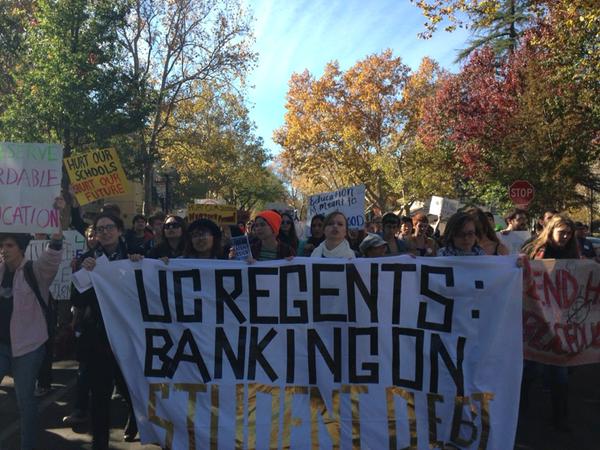 |
On November 24, 2014, students at the University of California staged massive statewide walkouts in protest of significant tuition hikes for the next five years. (photo by Reclaim UC) |
Editor's note: With many members helping their children through the college application process this time of year and anticipating financial aid packages from various institutions, we thought the following piece from Mirkin & Gordon might prove useful.
A college education generally leads to greater employment and earnings potential. However, it comes with a price. In 2012 approximately 70% of college students graduated with student loan debt that, nationally, averaged nearly $30,000.00 per students. There was between $900 billion and $1 trillion in outstanding student loan debt in 2012.
Although they generally have lower loan limits, federal student loans which account for almost 80% of all loan debt offer a number of advantages over private student loans. Federal student loans offer:
- Fixed interest rates generally ranging from 3.4% to 7.9%
- Repayment is deferred and interest does not start to accrue until after graduation
- Interest can often be deducted for income tax purposes
- Consolidation of multiple loans to afford the borrower a single payment
- There are no pre-payment penalties.
There are a number of programs aimed to assist you in repaying your federal student loan debt, including
- Deferment (interest does not accrue) and forbearance (interest continues to accrue) programs for financial hardship, illness or other criteria
- Loan forgiveness for teachers and public service employees
- Income-based repayment (15% discretionary income) and pay as you earn (10% of discretionary income) programs based upon financial hardship.
Repayment, however, is key to avoiding significant financial consequences. A default in repaying student loans can result in
- Automatic intercepts of income tax refunds and certain federal benfis such as social security and disability
- Wage garnishment of up to 15%
- A negative impact on one’s credit score which will result in higher credit-based costs such as auto insurance
- Harassment by debt collectors.
Significantly, there may be consequences to persons other than the borrower. For example
- A co-signor (e.g., a parent) will be liable for the loan if the borrower defaults
- Student loans may be considered marital debt in the event of a divorce thereby affecting the non-borrower spouse’s overall financial settlement/obligation.
Discharge of federal student loans is not common but is available in limited instances such as
- Death or total and permanent disability of the student
- Victim of 9/11
- Bankruptcy (very rare).
Understanding student loans is a daunting task. Under the Benefit Fund’s legal plan, a covered member may schedule an appointment with an attorney to discuss available legal measures if confronted with a student loan collection issue.
|
